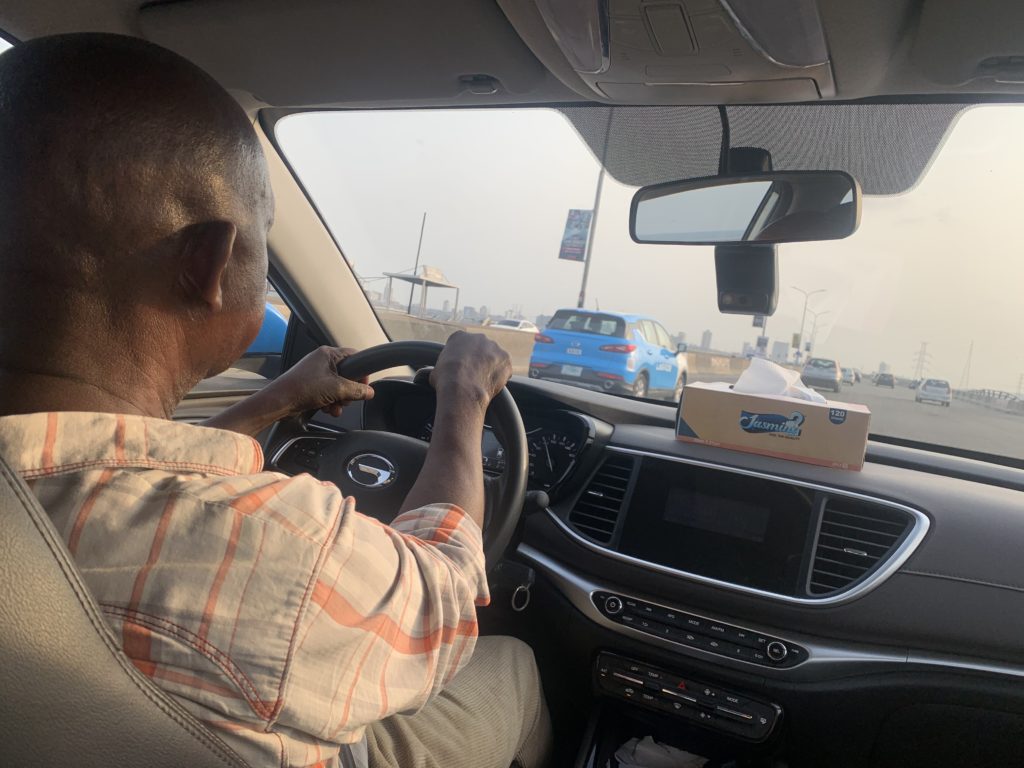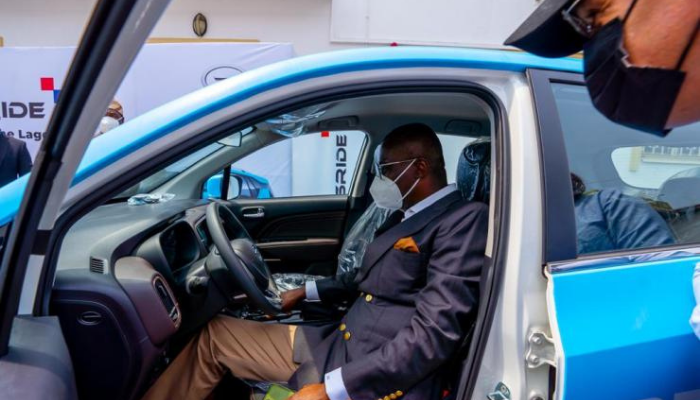Lagos, the highly-urbanised economic capital of Nigeria that houses over 24 million people, is different things to different people. For the average Lagosian—who spends 10 hours in traffic daily—the city is a symbol of overpopulation. But businesses in the mobility sector might beg to differ, or offer a different description of the city: a prime market with an addressable audience of tens of millions.
Perhaps, this is why ride-hailing behemoths including Uber and Bolt have been at each other’s throats in their quest to achieve dominance in the West African city. But as they yet compete with price wars and new products, a relatively new, government-backed service, Lagos Ride (Lagride), is gaining ground and positioning itself to be the dark horse of ride-hailing in Africa’s most populous city.
Lagride is the brainchild of the administration of Governor Babajide Sanwo-Olu, the Lagos State governor, who announced the initiative in 2021 as an alternative to the rickety yellow and black-coloured taxis scattered across the city. After the unceremonious ban of bike-hailing services in February 2020, the Lagos State government, through its officials, made statements such as, “Lagos is a megacity, and you can not build a megacity on two-wheelers.”
Acting on this premise a year later, the government introduced four-wheelers—named Lagride—into the market. The cars in the Lagride project are assembled in Lagos by the Choice International Group, the distributor of GAC motors in Nigeria.
With their sleek and modern SUV design, Lagride cars fit right into the government’s megacity picture of Lagos. What is more striking, however, is how the service seems to be finding a sweet spot in Lagos’ ride-hailing ecosystem.
Penetrating the Lagos market
As inflation soars amid stringent economic realities, more people are paying closer attention to the cost differences of moving around, and Lagride is capitalising on this, optimising for the affordability that bigger players are seeking to achieve through their price wars.
In December 2022, Lagosians in their thousands, buoyed by the holiday spirit, went on recreation sprees as they explored the city in its liveliest season. But it didn’t take long before many “outsiders” began to make public resolutions to stay indoors throughout the holidays. The cutthroat prices on the popular ride-hailing services were making it such that it cost more to get to some restaurants than to dine there.
“Bolt should just come out with its gun and mug us instead of this daylight robbery,” a Bolt user said in a now deleted tweet.
However, the problem was not unique to any one ride-hailing service. Nigeria, the largest oil producer in Africa, was experiencing a dire scarcity of fuel at the time. And with supply low, fuel prices leapt to new unregulated heights, with commuters as the paying guinea pigs.
In spite of this situation, lesser-known car-hailing companies like Rida, inDrive, and Lagride—all of which are major contenders for the third dominant spot in Nigeria’s ride-hailing market—were still able to offer relatively lower prices than UberX and Bolt, mostly because of their lower commission rates.
Beyond pricing, Lagride owes its growing popularity in the market to the world-class innovation in its ride-hailing product. As Lagos leads the country in the incidence and prevalence of crime, mobility solutions that guarantee user safety are more attractive to users.
The reality is that ride-hailing services in Lagos are generally dangerous. Gory tales of murdered users, missing drivers, and kidnapped riders abound across the internet. Lagride reduces the possibilities of such cases through its standby monitoring system which collects and sends out real-time audio and visual data—all connected to a system that, in the case of perceived danger, can alert local authorities with a single tap. In addition, Lagride’s driver training model employs a unique KYC process that ensures all drivers on the platform are thoroughly vetted, further reducing the prevalence of rogue drivers.
Local solutions, global thinking
Lagride’s crystal ball must have shone brightly when Tumi Adeyemi, CEO of Zenolynk Nig Ltd, emerged as one of the winners of a local hackathon in 2019. Organised by the Eko Innovation Centre, in partnership with the Office of the Special Adviser, Innovation and Technology, Lagos State, the hackathon’s initial call was for entrepreneurs to share solutions that could leverage technology to solve the traffic problems in Lagos. Adeyemi applied, and drew from his entrepreneurial experience in the smart mobility space to clinch a winning position, one that would later transform his company, Zenolynk, into the technology powerhouse behind Lagride.
Evidently, the government-backed ride-hailing service improved its technology over standards popularised by market leaders like Uber and Bolt. In-built telematics systems in Lagride cars ensure that drivers maintain smooth driving; continuous surveillance and tracking guarantees that the location of cars is always readily available and the cars can be remotely controlled or shut down in the event of a carjacking or robbery. Judging from these tech solutions built into the car fleet, Lagride is a classic example of adapting a global solution to the peculiarities of a local market.
Speaking to TechCabal about the innovation behind Lagride, Zenolynk’s CEO, Adeyemi said, “These value propositions are what made us the preferred bidder to operate and manage Lagride. Having operated in this space for a while, we understand the pain points of customers and are meeting them through refined solutions. [We are] not just replicating other models out there. And that is why, these days, people feel more secure when using Lagride to commute.”

Lifting Lagosians out of poverty
Lagride is what you get when you combine vehicle financing with the ride-hailing business. Ultimately, the government-backed service is helping to reduce the barrier to entry for mobility entrepreneurs, many of whom, prior to working with Lagride, could not have imagined themselves as future owners of brand new vehicles.
“These [Lagride] drivers are better off now. They are able to sort their bills and lift their families out of poverty. We are pulling people out of depression and essentially making commitments to ensure that people are productive and self-sustaining,” Adeyemi said.
Adeyemi is convinced that in a few years, Lagride will push beyond the struggle to be the third most dominant player in Lagos’ ride-hailing ecosystem. The gritty entrepreneur believes that with Lagride’s improved value offerings, edging out major competitors like Uber and Bolt is no longer a distant dream, but a foreseeable future.
“From pricing and comfort to security and availability of drivers, we are gradually positioning Lagride to become the premier ride-hailing service in Lagos, Africa’s most populous city,” Adeyemi concludes.
Carpooling; the next frontier
Zenolynk’s ambition to reduce the appalling traffic situation in Lagos State got the company onto the Lagos State Government’s radar in 2019, and now, through Lagride, the company is set to realise this ambition by powering carpooling services.
Adeyemi and his team attribute the traffic mess in Lagos to the growing number of private vehicles in the city. He reasons that if more people were incentivised to share rides, Lagos roads would be less congested.
“Lagride will roll out ride-sharing services in the second half of this year,” Adeyemi told TechCabal. “We have been able to convince people that they can trust Lagride to move around. Now, we want them to trust Lagride to move in groups.”
By offering carpooling services, Lagride will be entering a market notorious for churning out a series of failed startups. In 2018, GoMyWay, a vehicle-pooling company, ceased operations because it couldn’t raise follow-on funding to continue operations. But funding—or the lack of it—only becomes an issue when a startup is unable to rake in sustainable revenue. This was GoMyWay’s challenge. It was a startup that swung into the mobility space with credible backers and big dreams of expansion. Yet, sustainable revenue remained a pipe dream until the company was finally entombed.
Hytch, another vehicle-pooling startup, announced last week that it was closing shop. Back in 2022, Hytch claimed it had a solid business model, stable revenue, and a fast-growing user base. But what can these do for a business whose entire model rests on the need to change the prevalent consumer behaviour? Very little, it seems.
Undeterred by these failures, Lagride will launch its ride-sharing services to thousands of its users come H2 2023, and once again, the government-backed service hopes to outlive the skepticism of its success in this new vertical, just as it did when Lagride was originally launched.
Setting a national pace
Frederic Oladeinde, the Lagos State Commissioner of Transport, is effusive about the prospect of the Lagride scheme. According to him, the affordability of the cars (which only require a 10% down payment), the safety features for operations, and the structures put in place for car ownership and maintenance are core value propositions that make the scheme one of the best options for ride-hailing drivers in Lagos.
“Lagride is here to stay. In fact, we are currently anticipating the fresh rollout of about 250 cars into the scheme. So far, we have recorded commendable success and adoption since the first rollout of 1000 cars and are currently seeking to consolidate our efforts,” Oladeinde said to me over a call.
“To bear record of our success, some other states in Nigeria, including Abuja and Kano, have started considering replicating the scheme in their regions, and we are open to supporting them,” the commissioner revealed.





















